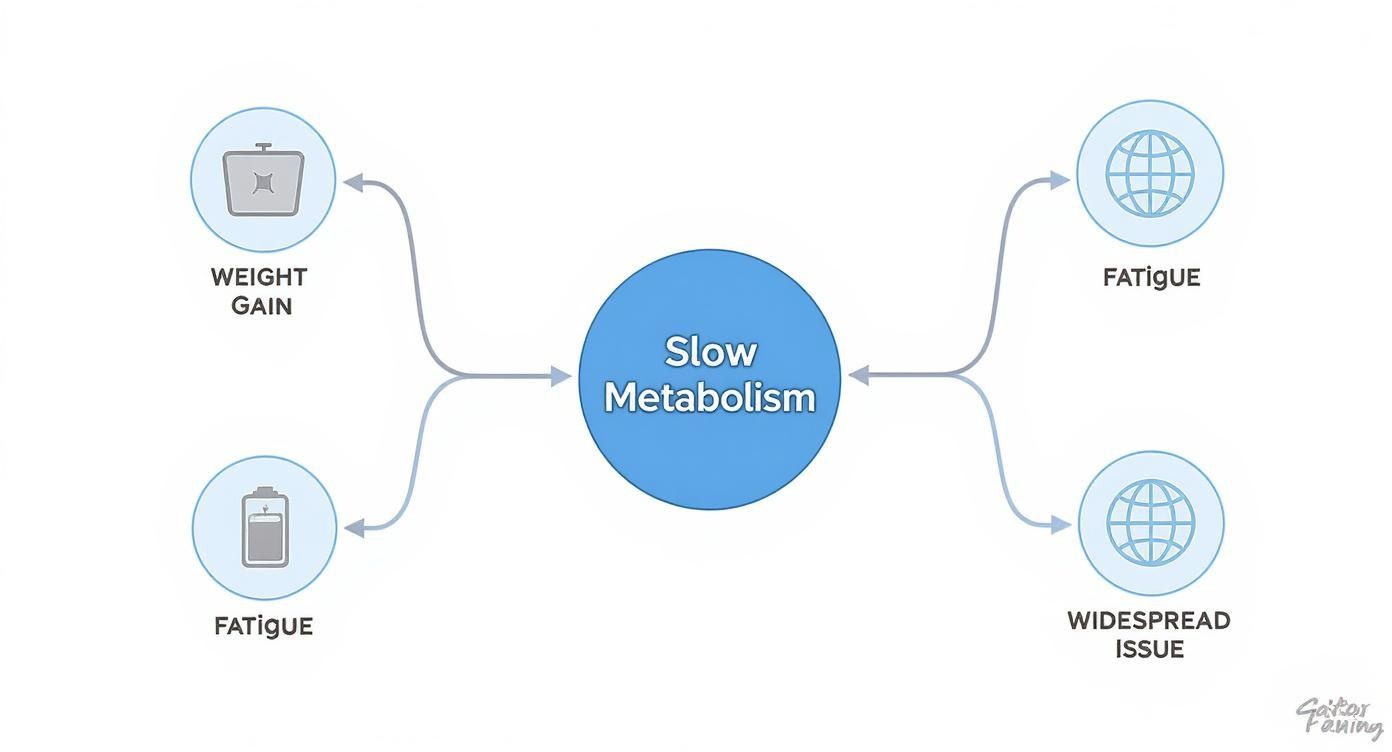
5 Symptoms of Slow Metabolism: How to Spot the Telltale Signs
Share
If you’re over 45 and find it harder to manage your weight or feel drained no matter how much you rest, you might be dealing with a slow metabolism. Common signs include unexplained weight gain, persistent tiredness, and feeling chilly more often than the people around you.
Is Your Metabolism Holding You Back?
Do you ever feel like you're doing everything right—eating well, staying active—but the number on the scale just won't budge? It’s a common frustration, and let’s be clear: it's not a personal failure.
That feeling is often tied directly to your metabolism, your body's internal engine. It’s responsible for turning everything you eat and drink into the energy that powers your life, from breathing to walking. As we get older, this engine can naturally start to slow down.
Learning to recognize the signals your body is sending is the first step toward taking back control of your health. This guide will help you spot those signs and understand what your body truly needs to thrive.
Why It Matters for Healthy Aging and Longevity
A sluggish metabolism impacts far more than just your waistline; it’s a cornerstone of your overall vitality and long-term health. A key sign is finding it incredibly difficult to lose weight, even when you’re sticking to a healthy diet and lifestyle.
This isn't just a personal struggle—it's a widespread trend. Research shows that the prevalence of metabolic syndrome in U.S. adults shot up by more than 35% in just two decades. You can see the full research on how metabolic health has changed over time.
This highlights why the old advice to "just eat less" often falls short. When your metabolism slows, your body burns fewer calories at rest. That makes it much easier to gain weight without any significant changes to your daily habits. We dive deeper into this in our guide on creating a calorie deficit for weight loss.
The Top 5 Signs Your Body's Engine Is Slowing Down
Think of your metabolism as your body's power plant. When it's running efficiently, it produces all the energy you need to feel your best. But when that internal engine slows, the energy output drops, and your body begins sending clear signals that something has shifted.
It's easy to dismiss these symptoms as just part of getting older or being stressed. But once you understand how they connect to your metabolic health, you can start taking effective steps to get back on track and support healthy living.
1. Stubborn Weight Gain
This is often the first thing people notice. You're eating the same and moving just as much, but the pounds keep creeping on, especially around your midsection.
When your metabolism slows, your body needs fewer calories to perform its basic functions. Those extra, unburned calories are stored as fat. It can feel like you're fighting a losing battle, but this isn't about a lack of willpower—it's a change in your body's chemistry.
2. Persistent Fatigue
Do you feel tired all the time, even after a full night's sleep? That deep, persistent exhaustion can be a major clue. A sluggish metabolism struggles to efficiently convert food into the energy your cells need, leaving you feeling constantly drained.
This link becomes even clearer as we age. For instance, metabolic syndrome, a condition closely tied to a slowing metabolism, impacts nearly 40% of adults in their sixties. You can read more about the link between age and metabolic health to see how it can directly contribute to chronic fatigue.
This infographic breaks down how a slow metabolism connects to some of the most common issues people face.

As you can see, the physical symptoms you might be feeling often trace right back to your metabolic engine.
3. Feeling Cold Constantly
If you're always reaching for a sweater when everyone else feels comfortable, your metabolism could be the reason. Your metabolic rate plays a key role in generating body heat.
When that rate slows, your internal furnace doesn't produce as much warmth. This can lead to a lower core body temperature and that persistent feeling of being chilled, even in a warm room.
Key Insight: A slower metabolism doesn't just affect how many calories you burn; it also reduces the energy available for basic functions like maintaining body temperature, leading to that constant feeling of cold.
4. Changes in Skin and Nails
Healthy skin and strong nails require a steady supply of energy and nutrients to regenerate. When your metabolism is sluggish, that entire renewal process slows down.
You might start to notice:
- Dry, lackluster skin as cell turnover decreases.
- Brittle nails that seem to break or split easily.
5. Sluggish Digestion
Your metabolism sets the pace for everything, including how quickly your body processes food. A slowdown can lead to uncomfortable constipation and bloating because your digestive system is moving at a more leisurely pace.
Recognizing these signs is the first, most important step. Below is a quick summary of what to look out for.
Quick Guide to Slow Metabolism Symptoms
This table breaks down the key signs your body's metabolic engine might be running slow and the reasons behind them.
| Symptom | What It Feels Like | The Metabolic Connection |
|---|---|---|
| Weight Gain | Pounds creeping on, especially around the belly, despite a consistent diet and exercise routine. | Your body is burning fewer calories at rest, causing the excess to be stored as fat. |
| Fatigue | A deep, persistent sense of exhaustion that sleep doesn't seem to fix. | Your body isn't efficiently converting food into usable energy for your cells. |
| Feeling Cold | Constantly feeling chilled and reaching for a sweater when others are comfortable. | A slower metabolic rate generates less body heat, lowering your core temperature. |
| Skin & Nails | Dry, dull skin and nails that are brittle and break easily. | Reduced cell turnover and nutrient delivery due to a sluggish system. |
| Digestion Issues | Experiencing frequent constipation, bloating, and a general feeling of slowness. | The digestive tract slows down along with the rest of your body's processes. |
If this list feels familiar, it's a sign that it may be time to take action. The good news is that you have options. Exploring lifestyle changes and seeking personalized support can make a huge difference in your weight management goals. Blue Haven Rx can help you find the right path for your health journey.
What Causes Your Metabolism to Change Over Time?
If you feel like your body just doesn't burn calories the way it used to, you’re not imagining things. Your metabolism is not a fixed setting; it changes throughout your life due to several key biological shifts. Understanding these factors is the first step to adapting and staying in control of your health.
One of the biggest factors is the natural decline in muscle mass that happens with age, a process called sarcopenia. Muscle is your body’s metabolic engine—it burns calories even when you're at rest. As you lose muscle, your overall calorie burn slows down.
Hormones and Stress Are Major Players
Hormonal fluctuations are another key piece of the puzzle. For women, the transition into perimenopause and menopause brings changes in estrogen that can encourage fat storage around the midsection and affect how your body manages blood sugar. For a deeper dive, check out our guide on the causes of weight gain during menopause.
Men also experience hormonal shifts. A gradual drop in testosterone can lead to less muscle and a slower metabolic rate, impacting weight management.
Key Takeaway: It's not just about getting older. Specific biological events like age-related muscle loss (sarcopenia) and hormonal changes are primary drivers behind a shifting metabolism.
Chronic stress also plays a significant role. When life keeps you in a constant state of high alert, your body produces excess cortisol. This stress hormone can signal your body to store fat, particularly around your belly, disrupting your metabolic health.
Finally, a history of yo-yo dieting can leave a lasting mark. Repeatedly cutting calories drastically can teach your body to operate on less energy, effectively lowering your metabolic rate to conserve fuel. Understanding these factors makes it clear why managing your weight can feel so different now.
Ready to explore strategies built for your body today? You can start your journey with Blue Haven Rx.
How to Reignite Your Metabolic Health

Recognizing the signs of a sluggish metabolism is the first step. The next is taking action. Instead of chasing quick fixes, the focus should be on smart, sustainable strategies that support your metabolism for long-term health and longevity.
The goal isn't to fight your body—it's to work with it. By making a few key lifestyle changes, you can send a powerful signal to your internal engine that it's time to fire back up.
Prioritize Protein and Strength
One of the most effective ways to support your metabolism is to build and maintain muscle mass. Muscle is metabolically active tissue, meaning it burns more calories than fat, even when you’re at rest. This is crucial for healthy weight management.
A practical tip is to make protein a priority at every meal. Think lean meats, fish, eggs, beans, and legumes. Your body uses more energy to digest protein compared to fats and carbs, a process known as the thermic effect of food (TEF). This gives your metabolism a small but consistent boost.
Pairing a protein-rich diet with strength training is a powerful combination for healthy living. Consistency is key.
- Weight Training: Using free weights or machines two to three times a week can make a noticeable difference in your resting metabolic rate.
- Bodyweight Exercises: Pilates, squats, and push-ups are fantastic for building strength without a gym.
- Resistance Bands: These are a great, low-impact tool for toning muscle at home.
These activities help counteract age-related muscle loss, keeping your metabolic engine strong. If you feel like you've hit a wall, we've got some great ideas in our guide on how to overcome a weight loss plateau.
Add Intensity and Foundational Habits
While strength training builds your baseline burn, high-intensity interval training (HIIT) can provide an extra boost. HIIT involves short bursts of intense exercise followed by brief recovery periods. This method can keep your metabolism elevated for hours after your workout is over.
Beyond exercise, daily habits have a massive impact. Proper hydration is essential—even mild dehydration can cause your metabolism to dip. The same goes for sleep. Aiming for 7-9 hours of quality rest each night helps regulate hormones that control appetite and energy, which is vital for weight management.
There are always new tools to explore. For instance, learning how infrared saunas boost your metabolism and burn calories can add another interesting layer to your wellness routine.
When you combine these powerful, practical strategies, you create an environment where your metabolism can thrive.
Modern Support for Your Health Goals

Sometimes, even with a solid diet and exercise plan, you can hit a frustrating plateau. When you’re facing the symptoms of slow metabolism, adding medical support to your efforts can be the key to unlocking progress. Modern telehealth makes getting that support easier and more convenient than ever.
When you work with a healthcare professional, you get a wellness plan tailored to you—no more generic advice. This could involve one-on-one coaching to fine-tune your habits or, if appropriate, a discussion about advanced medical options for weight management.
A Partnership in Your Wellness Journey
This is where many people find that medical programs, like those involving GLP-1 medications for weight loss, can make a real difference. Always overseen by a provider, these programs are designed to work with your body’s biology to support weight management and overall metabolic health.
At its core, this approach is about partnership. It combines your commitment to a healthy lifestyle with expert guidance to help you achieve your goals for longevity and vitality.
Other avenues, such as NAD+ programs, might also be part of a discussion about boosting your cellular energy and feeling your best. The goal is to find the right mix of strategies that fits your unique body and lifestyle.
At Blue Haven Rx, we want to be your trusted partner on your health journey. Ready to see what a personalized plan could look like for you? The first step is our simple online assessment.
Have Questions About Metabolism? We Have Answers.
It’s completely normal to have questions as you learn more about your metabolic health. Let's tackle some of the most common ones.
Can I actually speed up my metabolism for good?
While you can't change your genetics, your daily habits play a huge role in how efficiently your body runs. It’s less about a permanent "fix" and more about consistently supporting your body.
Think of it this way: strength training builds muscle, which acts like a furnace that's always burning calories. Pair that with a protein-rich diet and an active lifestyle, and you're not just boosting your metabolism for a day—you're building a strong foundation for years to come, which is key to long-term weight management.
Is it a slow metabolism, or could it be something else?
This is an excellent question and highlights why professional guidance is so important. The classic symptoms of a slow metabolism—like weight gain and fatigue—can sometimes overlap with other health issues, such as an underactive thyroid.
Self-diagnosing can be tricky. The best way to know for sure is to talk with a healthcare provider. They can help rule out other conditions and create a plan that targets the true root cause, setting you up for successful, healthy living.
What’s the single best thing I can do to start?
The best first step is always one you can stick with. Instead of trying to overhaul your entire life overnight, pick one small, practical change and make it a habit.
Here are a few ideas:
- Try adding a brisk 20-minute walk after dinner.
- Focus on including a source of protein at breakfast to keep you full and fuel your muscles.
- Commit to drinking one extra glass of water each day.
Starting small creates momentum. Once that first habit feels natural, you can build on it. This approach makes creating a healthier lifestyle feel achievable and sustainable.
At Blue Haven Rx, we're here to provide the expert support and tools you need for real, lasting results. When you're ready to take control of your health with a plan personalized for you, start your journey with us today.